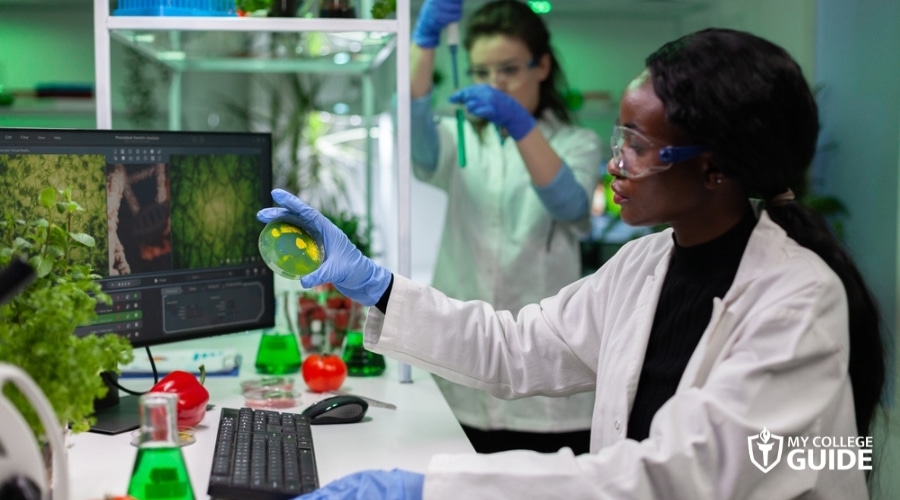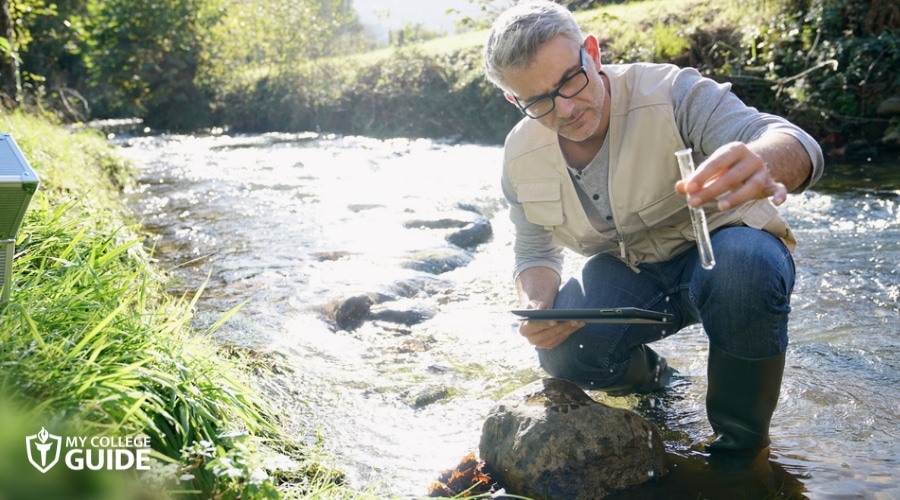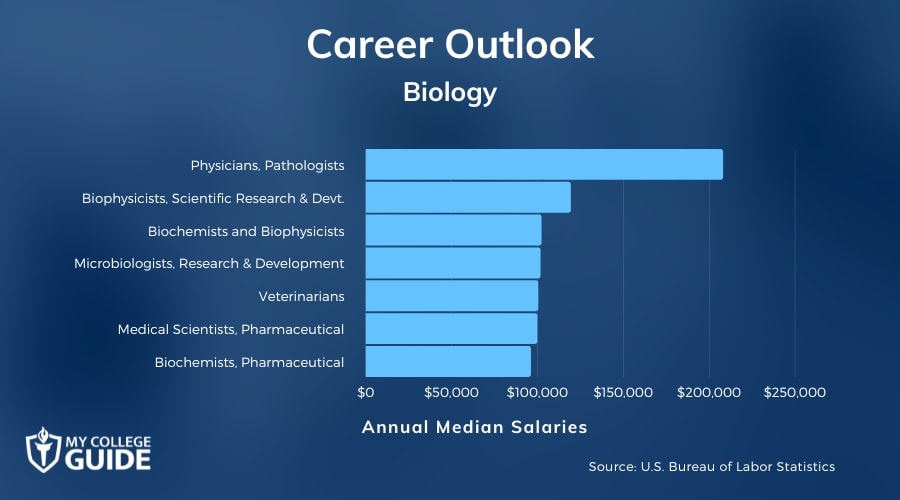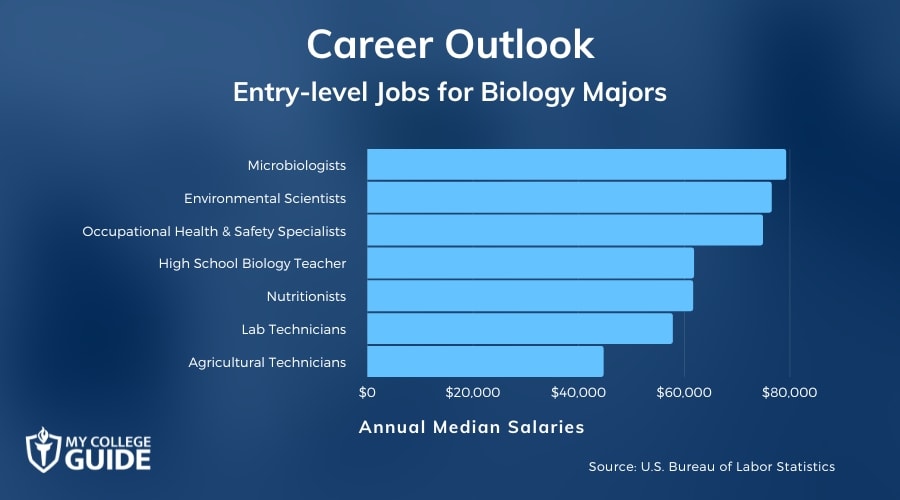There is a wide range of various biology careers once you complete a biology degree program. If you are someone with a scientific mind that enjoys exploring the wonders of the natural world, then a degree in biology can open the door to a number of prestigious, professional careers.

From research scientists to education, working within the field of biology allows you to use your intellect and skillset to make a major impact on the way that we view our natural environment.
Editorial Listing ShortCode:
Whether you are researching in a laboratory setting, teaching at a university, or working out in the field, there are a number of biology major jobs that can allow you to turn your biology degree into a rewarding career opportunity.
What Can You Do With a Biology Degree?

As with art careers and business careers, the field of biology is extremely diverse, and once you have graduated with your degree you will have the opportunity to work in a wide variety of fields, including healthcare, conservation, research, and education.
If you are interested in using science and biology to help solve crimes, you could look for a career in forensic science. Or, perhaps you’d like to be behind the scenes in the laboratory conducting research and analyzing samples as a biology technician.
Editorial Listing ShortCode:
Perhaps you want to research and analyze the environment to find new ways to protect our world’s precious ecosystems, in that case becoming an environmental scientist may be a great career path for you. There is a wide range of biology degree jobs available to those that hold biology degrees from working with organs and cells, or research and alaysis, to helping farms with agricultural needs.
10 Things You Can Do with a Degree in Biology
If you’re considering a biology degree, you may find that there are numerous satisfying career paths where you might find employment.
Based on data from the Bureau of Labor Statistics, the median salary for someone with a biology degree is $65,000. While some careers require additional education, listed below are careers you can pursue with a biology degree.
1. Human Biologist

Education Requirement: Bachelor’s degree
Human biologists examine and analyze the functions of the human body using genetics, physiology, and biological anthropology.
Using their research, these biologists frequently work in research laboratories to research cures for infectious diseases. State and federal governments need human biologists who can work in public health. They can also seek careers in education and healthcare, including as dieticians and nutritionists.
2. Genetic Counselor

Education Requirement: Master’s degree
Genetic counselors use their knowledge of human genetic composition to educate others and assist patients undergoing genetic testing. They frequently work directly with patients, helping them understand genetic testing results, including diagnosis and treatment options for genetic conditions.
Genetic counselors also assist pregnant women in identifying potential birth defects and maintaining and monitoring patient health during pregnancy. Supportive counseling and patient advocacy are also critical roles for genetic counselors.
3. Biological Technician

Education Requirement: Bachelor’s degree
Biology technicians frequently work as research assistants in research laboratories. They may collect samples for biologists or medical scientists, including blood, food, and bacteria. They may also help to maintain laboratory equipment and have a lot of experience in lab environments.
Biological technicians may also assist in documenting research results or performing fieldwork as part of the research process.
4. Environmental Scientist

Education Requirement: Bachelor’s degree
Environmental scientists seek ways to protect the environment and local ecosystems through research and analysis. They strive to solve problems related to pollution, overpopulation, natural disasters, waste disposal, water management, recycling, and overall public health.
Environmental scientists are also consulted by policy and lawmakers, consulting on issues from protecting natural resources to the climate and global environment. While many graduates pursue additional degrees for higher-level positions, there are career opportunities available with a bachelor’s degree in biology.
5. Forensic Scientist

Education Requirement: Bachelor’s degree
Forensic scientists primarily assist in criminal investigations through evidence analysis. Using their knowledge of biology and chemistry, they collect and analyze evidence at crime scenes, including DNA, blood types, and other organic matter.
Editorial Listing ShortCode:
Forensic scientists work to both procure evidence at the scene and to analyze the data to provide additional information about the crime that’s useful to investigators.
6. Pharmaceutical Sales Representative

Education Requirement: Bachelor’s degree
For graduates interested in business and sales, pursuing a career as a pharmaceutical sales representative can be a lucrative choice. Pharmaceutical manufacturers and distributors employ sales representatives to introduce and sell new medications to doctors and other medical professionals.
Sales representatives must have the medical knowledge to explain how a drug works, what condition(s) it treats, and how it compares to other drugs. Sales reps must also have strong communication and sales skills to meet with medical professionals.
7. Specialist Content Writer

Education Requirement: Bachelor’s degree
If you have strong biology and writing skills, you may have numerous opportunities as a technical content writer or environmental journalist.
Companies that manufacture medical equipment or other medical products may hire technical writers to simplify manuals into material that is easier to read for most users. Pharmaceutical companies also hire writers to create educational material or sales literature for new products.
There is also a growing need in environmental organizations for writers who understand and can explain complex topics in a way most readers can understand.
8. Agriculture or Food Science Technician

Education Requirement: Associate’s degree
Agriculture and food science technicians help scientists conduct tests, analyze data, and implement strategies with the goal of improving crop yields and food quality. These technicians assist in tracking data and maintaining equipment used to collect and analyze food, crops, and soil.
Agricultural technicians tend to work directly with farms to examine soil quality and work to prevent and eliminate viruses. Food scientists can work for government regulatory agencies or private businesses in quality control and testing for contaminants and nutrients.
9. Food Scientists

Education Requirement: Bachelor’s degree
Food scientists monitor our food’s safety, including regulating food safety protocols and creating quality assurance policies.
These scientists also impact the food supply chain by monitoring and predicting shortages and finding ways to increase food production and efficiency. Food scientists study factors from how land conditions affect food development, to food storage strategies and improvements.
10. Health Educator

Education Requirement: Bachelor’s degree
Health educators seek to educate communities about various topics related to public health and well-being. These educators use their knowledge of biology, nutrition, disease, exercise, the environment, and public health to create and deliver educational programs.
Editorial Listing ShortCode:
Health educators may find employment through municipal governments, community centers, educational institutions, and private businesses. Those seeking careers with a bachelors in biology can find numerous opportunities with private companies, federal and state governments, educational institutions, and healthcare facilities.
Types of Biology Majors

Students interested in pursuing biology science careers may first decide to narrow down their field of interest when completing their degree. While school programs vary, below are some common types of biology majors you may consider.
- Molecular Biology: This coursework focuses on the biology of organisms at the cellular level and how chemical reactions in cells affect how an organism functions.
- Microbiology: Microbiologists focus on microscopic organisms, including viruses and bacteria, with a possible focus on diseases, public health, and epidemiology.
- Entomology: This coursework focuses on studying insects, including their life cycle, genetics, and the impact on ecosystems, including the use of pesticides.
- Zoology: Zoology majors focus on studying animal life, including its physiology, ecosystems, behaviors, and biological characteristics.
- Botany: This coursework focuses on studying plant life and their environment with a focus on learning more about their physiology, reproduction, and morphology.
While some programs offer these studies as part of general biology degrees, other programs may offer majors in these specific areas.
Biology Careers & Salaries

To give you a better idea of the jobs available to you after graduating from your biology degree program, we have put together a list of the top 40 biology careers & salaries according to the U.S. Bureau of Labor Statistics:
| Careers | Annual Median Salaries |
| Physicians, Pathologists | $208,000 |
| Biophysicists, Scientific Research and Development | $119,330 |
| Biochemists and Biophysicists | $102,270 |
| Microbiologists, Research and Development | $101,680 |
| Veterinarians | $100,370 |
| Medical Scientists, Pharmaceutical | $99,830 |
| Biochemists, Pharmaceutical | $96,100 |
| Medical Scientists | $95,310 |
| Epidemiologists, Hospitals | $83,230 |
| Botanists | $82,530 |
| Physical Scientists | $82,090 |
| Biological Science Teachers, Postsecondary | $81,440 |
| Life Scientists | $80,140 |
| Medical Scientists, Hospitals | $79,800 |
| Medical Scientists, Physicians Office | $79,760 |
| Microbiologists | $79,260 |
| Epidemiologists | $78,830 |
| Technical Writers | $78,060 |
| Registered Nurses | $77,600 |
| Farm Managers | $73,060 |
| Microbiologists, Pharmaceutical | $72,490 |
| Agronomists | $66,750 |
| Animal Scientists | $65,090 |
| Zoologists and Wildlife Biologists | $64,650 |
| Foresters | $64,110 |
| Ecologists | $63,750 |
| Forensic Science Technicians | $61,930 |
| High School Biology Teachers | $61,820 |
| Middle School Science Teachers | $61,320 |
| Conservation Scientists, Social Advocacy Organizations | $60,400 |
| Biological Technicians, Pharmaceutical and Medicine Manufacturing | $59,770 |
| Clinical Laboratory Technologists and Technicians | $57,800 |
| Biological Technicians, Hospitals | $49,580 |
| Animal Caretaker Supervisors | $48,640 |
| Biological Technicians | $48,140 |
| Clinical Laboratory Technologists, Physicians Office | $47,890 |
| Health Technologists and Technicians | $46,910 |
| Veterinary Laboratory Technicians | $36,850 |
| Pharmacy Technicians | $36,740 |
| Veterinarian Assistants | $29,780 |
The careers associated with the field of biology have a wide variance in annual salary. It’s important to keep in mind that you may make more or less than the average wages shown due to your specification, degree level, and job experience.
For example, the BLS projects that those working as conservation scientists and foresters will see 5% occupational growth over the next 10 years. Additionally, biological technicians will see a 9% increase in the same time frame. Microbiologists are expected to see a 9% growth over the next decade as well. The biology career outlook is positive and full of opportunities.
Editorial Listing ShortCode:
With the diversity of careers ideas available to those who have graduated from a biology degree program, there is a wide variance in the occupational outlook associated with the different jobs. It is always a good idea to research your specific field of interest using sources such as the BLS to learn more about what you can expect when entering the workforce.
How to Know if a Degree in Biology is Right for Me

One of the exciting things about pursuing a biology major and biology major jobs is that there are opportunities for a wide range of interests, personalities, skills, and talents. As you consider if a biology degree is right for you, it may help to understand some common areas of interests, traits, and characteristics that successful graduates have in common.
Some characteristics and traits that can lead to successful careers in biology include:
- An interest in science
- The ability to collect and analyze data
- Critical thinking skills
- Problem-solving skills
- Enjoyment working in a laboratory
- Enjoyment working in the field or nature
- Strong communication skills
- Attention to detail
If you naturally have a strong inclination in some of these traits or desire to improve these skills through hands-on application, a degree in biology may be a good fit for you.
What Is a Biology Degree?

A biology degree is a degree program that studies a number of different facets of the scientific world. Through the course of your degree program, you may have the opportunity to specialize in a specific area of research.
In general, a biology degree gives you the opportunity to develop a foundational skillset pertaining to animals, plants, and microorganisms found in natural environments. From studying marine life to conservation or disease research, there are a number of exciting disciplines in the broad field of biology.
A few of the courses that you can expect to see throughout the course of your degree program include:
- Virology
- Ecological methods
- Animal care, research, and conservation
- Plant and environmental biology
- Pharmaceuticals
With advancements in technology, many accredited universities are now offering online biology degree programs for students who would like greater flexibility in their studies. Biology degrees online will often give you the opportunity to work at your own pace and log into classes at a time that is convenient for your busy schedule.
What Skills Do You Learn in Biology?

As a biology major, you can learn various skills that may help you succeed as you pursue biology degree jobs in numerous industries. Whether working in a laboratory or in the field, students must gain the data analysis, laboratory, and research skills needed to be successful biologists.
In addition to conducting research and analyzing the findings, biologists must also have the communication skills to clearly report these findings verbally and in writing. Lastly, students gain the scientific and technical expertise needed to conduct research in various settings.
Is Biology a Good Major?
Yes, biology is a good major for many undergraduate students. Since biology is such a diverse field, a biology degree opens the door to many career and educational opportunities.
Graduates may pursue careers in laboratories as researchers or research technicians or in the field as botanists, ecologists, or zoologists. According to the Bureau of Labor Statistics, agricultural or food scientists make an average annual salary of $74,160, with job growth anticipated to grow 8 percent over the next 10 years.
Editorial Listing ShortCode:
Graduates with a biology degree may also seek additional degrees in healthcare or other sciences, many of which prefer candidates with biology degrees.
Where Can I Work With a Biology Degree?

Graduates with a biology degree can find numerous possibilities available when seeking employment. According to the Bureau of Labor Statistics, the majority of professionals with a biology degree are employed in healthcare in both public and private institutions.
Graduates have also been employed in educational settings as teachers, in high school and postsecondary education, and in educating communities in public health. Many graduates have chosen to focus on business and sales, finding employment with pharmaceutical companies or medical device manufacturers.
Graduates also find employment in a variety of research and data analysis settings, including in research laboratories, private companies, and government regulatory agencies.
What Are Some Entry-level Jobs for Biology Majors?

For those seeking biology degree jobs directly after graduation, there are entry-level jobs you can pursue without additional degrees or certifications.
Below are some common entry-level careers and their median annual salaries, according to the Bureau of Labor Statistics.
| Careers | Annual Median Salaries |
| Microbiologists | $79,260 |
| Environmental Scientists | $76,530 |
| Occupational Health and Safety Specialists | $74,870 |
| High School Biology Teachers | $61,820 |
| Nutritionists | $61,650 |
| Lab Technicians | $57,800 |
| Agricultural Technicians | $44,700 |
Based on data from the Bureau of Labor Statistics, careers with a biology degree pay higher than average salaries, with continued job growth anticipated over the next ten years.
What Are the Highest Paying Jobs with a Biology Degree?

There are numerous satisfying and lucrative career opportunities, especially for graduates who complete additional education, pursuing master’s or doctoral degrees.
Based on data from the Bureau of Labor Statistics, listed below are some of the highest-paying jobs for graduates with a biology degree.
| Careers | Annual Median Salaries |
| Physicians, Pathologists | $208,000 |
| Medical and Health Services Managers | $101,340 |
| Biomedical Engineers | $97,410 |
| Medical Scientists | $95,310 |
| Genetic Counselors | $80,150 |
| Postsecondary Teachers | $79,640 |
With healthcare, research, and education jobs on the rise and with anticipated growth, there will always be a need for individuals with biology degrees.
Is a Biology Degree Worth It?

Yes, a biology degree is worth it for many professionals. The knowledge and skills learned with a biology degree can provide career opportunities in numerous public and private industries.
Editorial Listing ShortCode:
Professionals with biology degrees are leaders in healthcare settings, government agencies, pharmaceutical companies, and medical manufacturers, to name a few. According to the Bureau of Labor Statistics, employment for biology careers such as microbiologists is expected to grow 9 percent over the next 10 years, faster than average.
Getting Your Biology Degree Online

If you desire to use your science background to research, solve problems, educate others, help the environment, or study plants or animals, this may be an ideal program for you.
A biology degree can provide the skills you need if you seek a career in research, healthcare, government regulation, education, environmental protection, or pharmaceuticals. You may also wish to continue your postsecondary education, with a biology degree as the foundation for many masters and doctoral degrees.
If you wish to pursue opportunities in this innovative field, you may look into biology degrees online from accredited universities.
